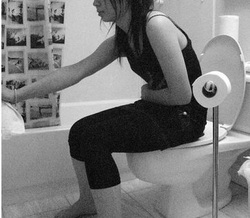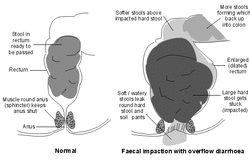Click to set custom HTML
Symptom finder - The causes of constipation

Symptom finder - The causes of constipation
The causes of constipation can be divided into acquired causes of constipation and congenital causes of constipation.
The acquired causes of constipation are drugs such as laxative abuse, atropine, tricyclic antidepressant, morphine and codeine phosphate, painful anus such as post hemorrhoidectomy, strangulated hemorrhoids, perianal abscess and fissure in ano, endocrine causes such as hyperparathyroidism, myxoedema and autonomic neuropathy ( diabetes), adynamic bowel such as spinal cord injury and paralytic ileus, obstruction such as extrinsic compression due to ovarian tumors, pregnancy, diverticular disease and carcinoma of the colon ( common in elderly and present as mucus discharge, rectal bleeding, loss of weight and constipation). Other causes are starvation, generalized disease, irritable bowel syndrome, depression, anxiety and changes in diet.
Hirschsprung’s disease is the congenital causes of constipation. Hirschsprung’s disease commonly present as swollen abdomen, constipation and empty rectum while performing digital rectal examination. Hirschsprung’s disease does not always present at birth. It is more apparent during teens.
What is constipation? Constipation is a decrease in term of frequency of defecation or abnormal firm motion reported by the patient. Constipation is related to the patient bowel habit. Sudden admission to hospital, generalized abdominal disease or acute intestinal obstruction are presented with acute constipation.
Patient with Hirschsprung’s disease will present with problem of constipation at birth. Eventually gross distention of the abdomen will occur. It may become prominent during teens that progress later into adult.
Drug history is important . Chronic abuse of laxatives will cause the bowel to be lazy and leads to constipation. Certain condition such as perianal abscess, fissure in ano, hemorrhoid, strangulated hemorrhoid ( past history of hemorrhoids) and hemorrhoidectomy may lead to disorder of the anus and cause painful defecation. The patient may become constipated in this case.
Constipation may also occur due to diabetic autonomic neuropathy per se. Skin changes, coarse hair, cold intolerance and constipation are associated with myxoedema. Constipation may also occur due to hyperparathyroidism or hypercalcemia. These conditions may also present with mental disturbance, abdominal pain, vomiting, nausea and nocturia.
Constipation is associated with distended bowel. Distended bowel is due to paralytic ileus. The causes of paralytic ileus are fracture of the spine, elderly prolonged bed rest, abdominal inflammatory condition and abdominal surgery.
Constipation is also associated with obstruction . Obstruction is caused by pressure from adjacent areas such as the large fibroids,ovarian cyst and pregnancy. Besides that, constipation may also occur due to diverticular disease with or without stricture. Obstructive causes of constipation are presented with lethargy, loss of weight, bloating, spurious diarrhea and colicky abdominal pain . The onset is usually gradual but may be occasional in certain cases.
The causes of constipation can be divided into acquired causes of constipation and congenital causes of constipation.
The acquired causes of constipation are drugs such as laxative abuse, atropine, tricyclic antidepressant, morphine and codeine phosphate, painful anus such as post hemorrhoidectomy, strangulated hemorrhoids, perianal abscess and fissure in ano, endocrine causes such as hyperparathyroidism, myxoedema and autonomic neuropathy ( diabetes), adynamic bowel such as spinal cord injury and paralytic ileus, obstruction such as extrinsic compression due to ovarian tumors, pregnancy, diverticular disease and carcinoma of the colon ( common in elderly and present as mucus discharge, rectal bleeding, loss of weight and constipation). Other causes are starvation, generalized disease, irritable bowel syndrome, depression, anxiety and changes in diet.
Hirschsprung’s disease is the congenital causes of constipation. Hirschsprung’s disease commonly present as swollen abdomen, constipation and empty rectum while performing digital rectal examination. Hirschsprung’s disease does not always present at birth. It is more apparent during teens.
What is constipation? Constipation is a decrease in term of frequency of defecation or abnormal firm motion reported by the patient. Constipation is related to the patient bowel habit. Sudden admission to hospital, generalized abdominal disease or acute intestinal obstruction are presented with acute constipation.
Patient with Hirschsprung’s disease will present with problem of constipation at birth. Eventually gross distention of the abdomen will occur. It may become prominent during teens that progress later into adult.
Drug history is important . Chronic abuse of laxatives will cause the bowel to be lazy and leads to constipation. Certain condition such as perianal abscess, fissure in ano, hemorrhoid, strangulated hemorrhoid ( past history of hemorrhoids) and hemorrhoidectomy may lead to disorder of the anus and cause painful defecation. The patient may become constipated in this case.
Constipation may also occur due to diabetic autonomic neuropathy per se. Skin changes, coarse hair, cold intolerance and constipation are associated with myxoedema. Constipation may also occur due to hyperparathyroidism or hypercalcemia. These conditions may also present with mental disturbance, abdominal pain, vomiting, nausea and nocturia.
Constipation is associated with distended bowel. Distended bowel is due to paralytic ileus. The causes of paralytic ileus are fracture of the spine, elderly prolonged bed rest, abdominal inflammatory condition and abdominal surgery.
Constipation is also associated with obstruction . Obstruction is caused by pressure from adjacent areas such as the large fibroids,ovarian cyst and pregnancy. Besides that, constipation may also occur due to diverticular disease with or without stricture. Obstructive causes of constipation are presented with lethargy, loss of weight, bloating, spurious diarrhea and colicky abdominal pain . The onset is usually gradual but may be occasional in certain cases.

Depressive patient who suffer from waking early, change in sleep pattern and difficulty to return to bed and anxious patient may also complain of constipation. Irritable bowel syndrome patient may suffer from alternating diarrhea and constipation or diarrhea and constipation only. Patient who reduce food intake or trying to loss weight by reducing or change the diet may also suffer from constipation. Generalized disease that influence the appetite may also cause constipation.
On examination, the abdomen is distended with high pitched tickling bowel sounds due to obstruction of the bowel. Mass may be palpable in case of malignancy in the abdomen. Tenderness in left iliac fossa may present with diverticular stricture. Digital rectal examination may reveal empty rectum.
In adynamic bowel, the abdomen is distended in a painless fashion. There will be an absent of bowel sound . Look for signs of recent surgery. Neurological examination should be performed.
Chronic fissure in ano, perianal abscess and strangulated hemorrhoids may be detected on inspection of the anus. It is painful an often impossible to perform digital rectal examination in patient with fissure in ano. Without appropriate medication, patient post hemorrhoidectomy is predisposed to constipation.
Always looks for other signs of complication of diabetes. Observe for other signs such a slow relaxing reflexes, hoarse voice, large tongue or dry or coarse hair in case of myxoedema. Digital rectal examination is mandatory for patient with constipation . The rectum may contain rock - hard mass of the feces due to functional constipation or completely empty rectum in case of obstruction.
The investigation may include full blood count, urea and electrolytes, ESR, liver function test, abdominal x ray, sigmoidoscopy, thyroid function test, blood glucose, serum calcium, colonoscopy, barium enema, MRI scan and ultrasound scan.
Full blood count may reveal low in hemoglobin in anemia which is due to malignancy ( carcinoma of the bowel). Elevated white cell count is due to diverticulitis while raised ESR is due to malignancy.
Obstructive causes of constipation may also cause dehydration and raised in the level of the urea. Low level of albumin is associated with starvation. Abdominal x ray may reveal dilated loop of bowel ( obstruction). Sigmoidoscopy and biopsy are useful to identify the present of tumor or Hirschsprung disease which is present with absences of the ganglion cells.
Thyroid function test is useful to rule out myxoedema ( hypothyroidism ). Low T4 level and high TSH level. Hyperparathyroidism is detected by measuring the serum calcium . Blood glucose is useful to detect the present of diabetes / autonomic neuropathy, Colonoscopy and biopsy for detection of the tumor.Barium enema is useful for diverticular disease and tumor. Barium enema is useful for detection of diverticular disease and MRI scan may reveal spinal disease or spinal tumor . Ultrasound scan may reveal fibroids, ovarian cysts, pregnancy and tumors.
On examination, the abdomen is distended with high pitched tickling bowel sounds due to obstruction of the bowel. Mass may be palpable in case of malignancy in the abdomen. Tenderness in left iliac fossa may present with diverticular stricture. Digital rectal examination may reveal empty rectum.
In adynamic bowel, the abdomen is distended in a painless fashion. There will be an absent of bowel sound . Look for signs of recent surgery. Neurological examination should be performed.
Chronic fissure in ano, perianal abscess and strangulated hemorrhoids may be detected on inspection of the anus. It is painful an often impossible to perform digital rectal examination in patient with fissure in ano. Without appropriate medication, patient post hemorrhoidectomy is predisposed to constipation.
Always looks for other signs of complication of diabetes. Observe for other signs such a slow relaxing reflexes, hoarse voice, large tongue or dry or coarse hair in case of myxoedema. Digital rectal examination is mandatory for patient with constipation . The rectum may contain rock - hard mass of the feces due to functional constipation or completely empty rectum in case of obstruction.
The investigation may include full blood count, urea and electrolytes, ESR, liver function test, abdominal x ray, sigmoidoscopy, thyroid function test, blood glucose, serum calcium, colonoscopy, barium enema, MRI scan and ultrasound scan.
Full blood count may reveal low in hemoglobin in anemia which is due to malignancy ( carcinoma of the bowel). Elevated white cell count is due to diverticulitis while raised ESR is due to malignancy.
Obstructive causes of constipation may also cause dehydration and raised in the level of the urea. Low level of albumin is associated with starvation. Abdominal x ray may reveal dilated loop of bowel ( obstruction). Sigmoidoscopy and biopsy are useful to identify the present of tumor or Hirschsprung disease which is present with absences of the ganglion cells.
Thyroid function test is useful to rule out myxoedema ( hypothyroidism ). Low T4 level and high TSH level. Hyperparathyroidism is detected by measuring the serum calcium . Blood glucose is useful to detect the present of diabetes / autonomic neuropathy, Colonoscopy and biopsy for detection of the tumor.Barium enema is useful for diverticular disease and tumor. Barium enema is useful for detection of diverticular disease and MRI scan may reveal spinal disease or spinal tumor . Ultrasound scan may reveal fibroids, ovarian cysts, pregnancy and tumors.
